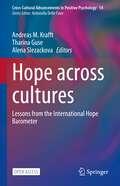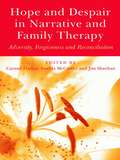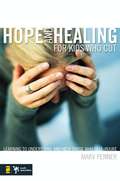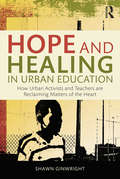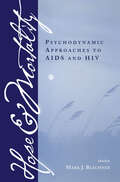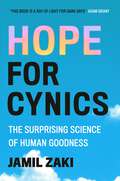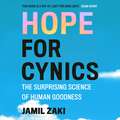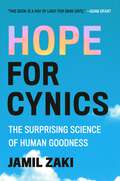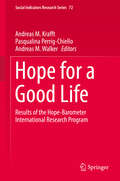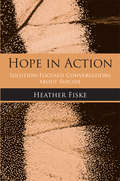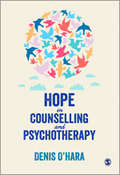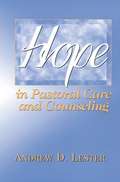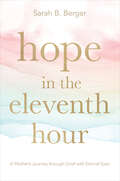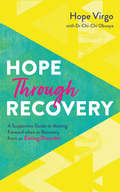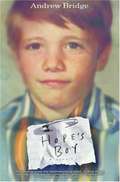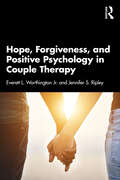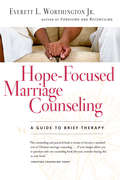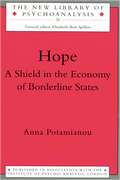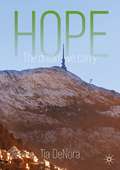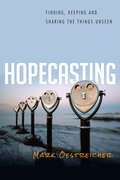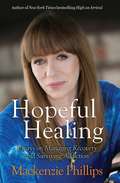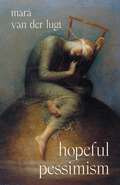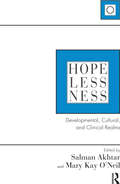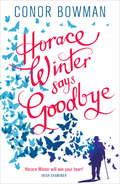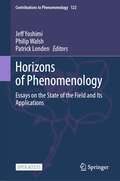- Table View
- List View
Hope across cultures: Lessons from the International Hope Barometer (Cross-Cultural Advancements in Positive Psychology #14)
by Andreas M. Krafft Tharina Guse Alena SlezackovaThis open access book presents an integrative and transdisciplinary conceptualization of hope and brings together cross-cultural studies based on quantitative data from around the globe. It incorporates state-of-the-art theories of hope from psychology, philosophy and theology and presents a novel approach to the study of hope in different life situations. The volume analyses empirical data from the Hope Barometer international research network, collected from more than 40,000 participants between 2017 and 2021. The authors use this broad database to investigate the nature and value of hope for well-being and flourishing at individual and societal levels, in various regions, and different cultural, religious and social backgrounds. The chapters study the cultural characteristics of different facets and elements of hope and furthermore explore its common qualities to elucidate the universal nature of hope across cultures. Comprehensive, transdisciplinary and cross-cultural in scope, this volume is of interest to a global readership across the social and behavioural sciences.
Hope and Despair in Narrative and Family Therapy: Adversity, Forgiveness and Reconciliation
by Jim Sheehan Carmel Flaskas Imelda McCarthyHow do experiences of hope and despair impact upon our capacity to meet life's challenges in narrative and family therapy? Clients' experiences of hope and despair can be complex, reflecting individual and family histories, current patterns and dynamics, the stresses of everyday life, and the social contexts of families' lives. This book analyses how therapists meet and engage with these dichotomous aspects of human experience. The editors place the themes of hope and despair at the centre of a series of reflections on practice and theory. Contributors from all over the world are brought together, incorporating a range of perspectives from narrative, systemic and social constructionist frameworks. The book is divided into three sections, covering: reflections on hope and despair facing adversity: practices of hope reflections on reconciliation and forgiveness. Hope and Despair in Narrative and Family Therapy looks at the importance of hope in bringing about positive therapeutic change. This book will be of great use to family therapists, psychotherapists, counsellors, and students on therapeutic training courses.
Hope and Healing for Kids Who Cut: Learning to Understand and Help Those Who Self-injure
by Marv PennerYou may have noticed them-the kids who are hiding their pain under long sleeves or wristbands. Or you might never notice them-the ones who seem to have life together except for the deep secret that they keep hidden beneath their clothes. This is no longer
Hope and Healing in Urban Education: How Urban Activists and Teachers are Reclaiming Matters of the Heart
by Shawn GinwrightHope and Healing in Urban Education proposes a new movement of healing justice to repair the damage done by the erosion of hope resulting from structural violence in urban communities. Drawing on ethnographic case studies from around the country, this book chronicles how teacher activists employ healing strategies in stressed schools and community organizations, and work to reverse negative impacts on academic achievement and civic engagement, supporting their students to become powerful civic actors. The book argues that healing a community is a form of political action, and emphasizes the need to place healing and hope at the center of our educational and political strategies. At once a bold, revealing, and nuanced look at troubled urban communities as well as the teacher activists and community members working to reverse the damage done by generations of oppression, Hope and Healing in Urban Education examines how social change can be enacted from within to restore a sense of hope to besieged communities and counteract the effects of poverty, violence, and hopelessness.
Hope and Mortality: Psychodynamic Approaches to AIDS and HIV
by Mark J. BlechnerAIDS has humbled us. Thus observes editor Mark Blechner in introducing readers to this powerful collection of essays on psychodynamic approaches to AIDS. It is the disease, Blechner tells us, that "has forced us to rethink our relation to sickness and health, mortality, sexuality, drug use, and what we consider valuable in life." In the chapters that follow, experienced clinicians shatter myths about the inapplicability of psychoanalysis to work with AIDS patients. In addition to setting forth general principles involved in working with patients with serious illness, Hope and Mortality explores the wide range of therapeutic issues that have arisen in the wake of AIDS. Among the topics of individual chapters: working with children whose parents have AIDS; working with AIDS patients in an inner-city hospital; disability, dementia, and other realities of late-stage AIDS; treating someone who becomes HIV-positive while in therapy; leading a support group for gay men with AIDS; confronting fears of HIV in the "worried well"; and coming out of the closet as a heterosexual while running a bereavement group for gay men. Most poignant of all are chapters in which therapists examine how they have been transformed by treating people with AIDS. Here contributors candidly discuss how their attitudes toward death have shaped, and in turn been shaped by, their clinical work. They tell of recovering near-death memories, of questioning their reliance on traditional medicine, and of feeling the numbing effects of multiple loss with their patients. The AIDS epidemic has become so widespread that every clinician must learn about the disease and the psychological issues it raises. Hope and Mortality provides an illuminating exploration of these issues and raises profound questions about the overall aims of psychotherapy. It will instruct and challenge all mental health professionals, and provide hope and enlightenment to anyone dealing with a life-threatening condition.
Hope for Cynics: The Surprising Science Of Human Goodness
by Jamil ZakiCynicism is making us sick; Stanford psychologist Dr Jamil Zaki has the cure - a 'ray of light for dark days' (Adam Grant, #1 New York Times bestselling author).For thousands of years, people have argued about whether humanity is selfish or generous, cruel or kind. But recently, our answers have changed. In 1972, half of Americans agreed that most people can be trusted; by 2018, that figure had fallen to 30%. Different generations, genders, religions and political parties can't seem to agree on anything, except that they all think human virtue is evaporating. Cynicism is a perfectly understandable response to a world full of injustice and inequality. But in many cases, cynicism is misplaced. Dozens of studies find that people fail to realise how kind, generous and open-minded others really are. And cynical thinking worsens social problems, because our beliefs don't just interpret the world; they change it. When we expect people to be awful, we coax awfulness out of them. Cynicism is a disease, with a history, symptoms and a cure. Through science and storytelling, Jamil Zaki imparts the secret for beating back cynicism: hopeful scepticism. This approach doesn't mean putting our faith in every politician or influencer. It means thinking critically about people and our problems, while simultaneously acknowledging and encouraging our strengths. Far from being naïve, hopeful scepticism is a more precise way of understanding others, and paying closer attention re-balances how you think about human nature. As more of us do this, we can take steps towards building the world we truly want.
Hope for Cynics: The Surprising Science Of Human Goodness
by Jamil ZakiCynicism is making us sick; Stanford psychologist Dr Jamil Zaki has the cure - a 'ray of light for dark days' (Adam Grant, #1 New York Times bestselling author).For thousands of years, people have argued about whether humanity is selfish or generous, cruel or kind. But recently, our answers have changed. In 1972, half of Americans agreed that most people can be trusted; by 2018, that figure had fallen to 30%. Different generations, genders, religions and political parties can't seem to agree on anything, except that they all think human virtue is evaporating. Cynicism is a perfectly understandable response to a world full of injustice and inequality. But in many cases, cynicism is misplaced. Dozens of studies find that people fail to realise how kind, generous and open-minded others really are. And cynical thinking worsens social problems, because our beliefs don't just interpret the world; they change it. When we expect people to be awful, we coax awfulness out of them. Cynicism is a disease, with a history, symptoms and a cure. Through science and storytelling, Jamil Zaki imparts the secret for beating back cynicism: hopeful scepticism. This approach doesn't mean putting our faith in every politician or influencer. It means thinking critically about people and our problems, while simultaneously acknowledging and encouraging our strengths. Far from being naïve, hopeful scepticism is a more precise way of understanding others, and paying closer attention re-balances how you think about human nature. As more of us do this, we can take steps towards building the world we truly want.
Hope for Cynics: The Surprising Science of Human Goodness
by Jamil ZakiAmazon Editors' Pick for Best Nonfiction Books of 2024 Cynicism is making us sick; Stanford Psychologist Dr. Jamil Zaki has the cure—a &“ray of light for dark days&” (Adam Grant, #1 New York Times bestselling author). For thousands of years, people have argued about whether humanity is selfish or generous, cruel or kind. But recently, our answers have changed. In 1972, half of Americans agreed that most people can be trusted; by 2018, only a third did. Different generations, genders, religions, and political parties can't seem to agree on much, but they all think human virtue is evaporating. Cynicism is an understandable response to injustice and inequality. But in many cases, it is misplaced. Dozens of studies find that people fail to realize how kind, generous, and open-minded people really are. And cynical thinking deepens social problems: when we expect the worst in people, we often bring it out of them. We don't have to remain stuck in this cynicism trap. Through science and storytelling, Jamil Zaki imparts the secret for beating back cynicism: hopeful skepticism—thinking critically about people and our problems while honoring and encouraging our strengths. Far from being naive, hopeful skepticism is a precise way of understanding others that can rebalance our view of human nature and help us build the world we want.
Hope for a Good Life: Results Of The Hope-barometer International Research Program (Social Indicators Research Series #72)
by Andreas M. Krafft Andreas M. Walker Pasqualina Perrig-ChielloThis volume addresses the convincing belief that hope is an existential need and resource for living a good life, not only when all is going well, but especially in difficult times. The findings reported in this volume result from the annual survey of the Hope-Barometer Research Program collected during 7 years and conducted in several countries. Structured in three parts, the first one provides the reader with a general introduction into the topic of hope, the theoretical and methodological foundations and major general results of the Hope-Barometer. Part two presents specific topics related to the levels and variations of hope across different population groups, and the relationship of hope with several measures of well-being. Further part three focuses on comparisons of elements and levels of hope across cultures discussing methods and techniques to improve hope and thus increase overall well-being.
Hope in Action: Solution-Focused Conversations About Suicide
by Heather FiskeRespectful and effective solution-focused brief therapy (SFBT) for suicidal clients Few tasks are more important—and daunting—than to help someone who is suicidal to go beyond the darkness of hopelessness to the light of hope. Hope in Action: Solution-Focused Conversations About Suicide is a unique resource providing fresh approaches to treating individuals and families where suicide is an issue. This comprehensive book provides a thorough grounding in using a solution-focused therapy approach to elicit and reinforce hope and reasons for living. Strategies are demonstrated with stories, case vignettes, and transcripts. Special applications include some of the most challenging high-risk clients that therapists treat, including people who make repeated attempts. This powerful resource offers a set of practice principles based on the existing empirical evidence in the context of clinical utility and client expertise. Hope in Action: Solution-Focused Conversations About Suicide provides case transcripts to help in role-play or rehearsal situations as well as numerous practical tips. The book also provides lists of solution-focused questions for use in various situations, including suicide crisis, the use of anti-depressant medications, facilitation of collaborative working relationships with colleagues as well as clients. Each application chapter gives therapists practical, hands-on tools and uses stories and illustrations to make the book user-friendly. The text also offers a brief appendix on the basic skills of SFBT. Topics discussed in Hope in Action: Solution-Focused Conversations About Suicide include: current knowledge about preventing suicide at the individual level helping clients to utilize their strengths even when they are in crisis how research in diverse areas supports the solution-focused approach effective treatment for couples and families when one member is suicidal basic approaches to effective therapy with young children and teens who have attempted suicide respectful, effective therapy with people who seem to have adopted being suicidal as their primary coping strategy therapeutic tools that help the therapist to stay hopeful about clients and strengthen the therapeutic relationship Hope in Action: Solution-Focused Conversations About Suicide is a valuable resource for counselors and therapists at every experience level.
Hope in Counselling and Psychotherapy
by Denis O′Hara′This book represents a major contribution to the literature of several professions. Presenting an account both rich and broad, the author provides a summary and overview of ′hope′ from philosophical, nursing, psychotherapeutic and research perspectives.′ Ian Townsend, Associate Lecturer in Counselling, Blackburn College Engendering ′hope′ is at the heart of counselling and psychotherapy but, until now, little attempt has been made to actually explain howand why it may be fostered. Understanding the central role of hope in healing and personal growth is an essential element of counsellor training and practice. It forms the basis of the therapeutic relationship and is integral to the very aims and motivation of counselling. Keeping theory firmly grounded in real-life practice, this book explores: -The nature of hope and how it is conceptualised from different theoretical perspectives. -The common psychotherapeutic practices which engender hope and how they translate into effective practice -The role of the counsellor in the process -How to manage expectations and work effectively with clients suffering with severe and enduring psychological challenges -Hope measures, and how to be a research-informed practitioner. Packed full of case examples, practical exercise and points for reflection, this book is essential reading for any training or practising healthcare professional looking to understand the role of hope in the process of change.
Hope in Pastoral Care and Counseling
by Andrew D. LesterThis book focuses on clinical theories and methods for pastoral assessment of intervention with those who despair and offers a corrective measures to these stories through deconstruction, re-framing, and reconstruction.
Hope in the Eleventh Hour: A Mother's Journey through Grief with Eternal Eyes
by Sarah B. BergerWhen Sarah Berger&’s nineteen-year-old son went to heaven in an inexplicable single-car accident, Sarah found herself plunged into soul-searing grief—the kind that can ruin marriages and destroy faith. But that is not her story. With an unrelenting grip on the Lord&’s hand, Sarah clung to the promise that God is close to the brokenhearted. Now, for the many others who grieve losing loved ones to accidents, illnesses, and even suicide, Sarah points them to the God of all comfort.Hope in the Eleventh Hour helps readers: Understand what it means to grieve with hope.Realize their loved one in Christ is truly part of the great cloud of witnesses.Trust God with the hardest questions.Receive God&’s comfort through Scripture, dreams, nature, and divine encounters.Find joy in the present as they wait for the eternal. This intimate yet practical book opens readers&’ hearts and minds to embrace God&’s promises in the midst of grief and brokenness.
Hope through Recovery: Your Guide to Moving Forward when in Recovery from an Eating Disorder
by Hope Virgo Chi-Chi ObuayaIn this practical guide to life in recovery, mental health campaigner and survivor Hope Virgo offers practical and emotional support tools for anyone who has had an eating disorder, whatever the type. The book combines her personal experience with her work with parents, patients, educators and health workers. Consultant Psychiatrist Dr Chi-Chi Obuaya lends his clinical experience and knowledge, giving additional guidance and advice throughout.Learn about Hope’s story, the myths about eating disorders, and where you may be in your own recovery. Look at the building blocks for a successful recovery, and the situations you may encounter in daily life that will challenge your recovery. Hope unpicks how to cope and learn from these experiences. Finally, she looks at the possibility of relapse, and how to deal with this if it happens to you. Read from beginning to end or dip in and out when you need extra support and help. This is the book Hope wished she'd had when she was fresh out of hospital and entering back into the ‘real world’.
Hope's Boy
by Andrew BridgeAutobiography of Andrew Bridge, who at age 7 was torn from his screaming mother's arms and put into foster care, going from one horrific situation to another, until he turned 18.
Hope, Forgiveness, and Positive Psychology in Couple Therapy
by Jennifer S. Ripley Everett L. Worthington Jr.This guide introduces the Hope-Focused Approach to couple therapy and provides a hands-on, practical resource for clinicians and students to integrate this approach into their practice effectively.Drawing from positive psychology, virtue theory, and forgiveness theory, the book describes how therapists can design a hope-focused treatment to promote intimacy, help couples communicate and resolve disagreements, strengthen emotional bonds, build trust, guide forgiveness, and encourage reconciliation. This book takes the therapist from assessing couples, to designing initial treatment plans, intervening in sessions, and facilitating termination. Focusing on communication training and conflict resolution, Worthington and Ripley share over 100 evidence-based techniques, case studies, and interventions to illustrate how to help couples effectively. Examples incorporate complex issues of race and sexuality, as well as values such as religion and politics. This practical guide arms therapists with a strategy to enrich their practice of couple therapy, equips them with practical techniques, and helps them promote forgiveness and reconciliation when couples seek it.This book is an invaluable resource for beginning counselors, graduate students, and practicing marriage and family therapists.
Hope-Focused Marriage Counseling: A Guide to Brief Therapy
by Everett L. Worthington Jr.drawing on central valuespromoting confession and forgivenessstrengthening communicationaiding conflict resolutionchanging patterns of thinkingdeveloping intimacycementing commitment
Hope: A Shield in the Economy of Borderline States (The New Library of Psychoanalysis)
by Anna PotamianouIn the well known myth of Pandora, hope was the last and most need gift at the bottom of a box of myriad misfortunes let loose on an unsuspecting world. For most human beings hope is a positive benefit. Anna Potamianou shows how in the 'borderline' patient hope can become a perverted and omnipotent means of denying reality. Indeed, in such individuals any state of mind or feeling can take on the status of an object, which is then used as a barrier against their fear of change. The psychic economy and dynamics of borderline states are not yet well understood and this book makes an important contribution to the clinical debate.
Hope: The Dream We Carry
by Tia DeNoraThis book provides a concise, interdisciplinary perspective on the emotion and practice of ‘hope'. Based on the idea that hope is a dream that we carry in different ways, the five chapters draw on the author’s original research and align it with literature on the sociology of culture and emotion, to explore the concept in relation to cultural and community practices and mental health.The climate crisis, violence, hostility, pandemics, homelessness, displacement, conflict, slavery, economic hardship and economic downturn, loneliness, anxiety, mental illness – are intensifying. There is a need for hope. There is also a need to confront hope - what is hope and what can, and cannot, be achieved by hoping. This confrontation includes distinguishing hope from wishful thinking and blind optimism. Using examples from different spheres of social life, including health, religion, music therapy, migration and social displacement, the book sets the idea of hope in context of situations of uncertainty, challenge and pain, and goes on to highlight the practical application of these ideas and outline an agenda for further research on ‘hope'.
Hopeful Healing: Essays on Managing Recovery and Surviving Addiction
by Mackenzie PhillipsActress and author of the courageous New York Times bestselling memoir High on Arrival, Mackenzie Phillips—Hollywood’s go-to person on substance abuse and a visible and outspoken advocate for addiction awareness and education—brings her knowledge and voice on the subject of recovery for the first time, and shares her experiences for those who are trying to overcome addiction.As the daughter of lead singers of the 1960s band The Mamas and The Papas, Mackenzie Phillips grew up in a dysfunctional environment and subsequently battled a near-fatal drug addiction. Now, delivered with warmth and candor, she presents the wisdom she gained from her own personal journey through addictions and her understanding of practical treatment from her work as a rehabilitation counselor. Using her own life experiences as examples of proven recovery methods, she shares the tools and holistic approaches that are available to help you on your journey to recovery. Treatment is not “one-size-fits-all” and Mackenzie encourages addicts and their support networks to research the methods that most effectively address their individual physical, mental, and spiritual wellbeing. Used by both recovering addicts and their families, Mackenzie’s book is a message of hope and reminds us that sobriety is a lifelong journey of the spirit that allows us to lift ourselves up even when we stumble and fall.
Hopeful Pessimism
by Mara van der LugtWhy &“hopeful pessimism&” is not a contradiction in terms but a powerful source of moral and political commitmentThe climate debate is rife with calls for optimism. While temperatures rise and disasters intensify, we are asked to maintain optimism and hope, as if the real threat is pessimism and despair. In this erudite and engaging book, Mara van der Lugt argues that this is a mistake: crude optimism can no longer be a virtue in a breaking world, and may well prove to be our besetting vice. In an age of climate change and ecological devastation, the virtue we need is hopeful pessimism.Drawing on thinkers that range from J.R.R.Tolkien and Mary Shelley to Albert Camus and Jonathan Lear, van der Lugt invites us to rethink what we thought we knew about optimism and pessimism, hope and despair, activism and grief. She shows that pessimism is closely linked to a tradition of moral and political activism, and offers a different way to think about pessimism: not as synonymous with despair but as compatible with hope. Gently yet fiercely, van der Lugt argues that what we need to avoid is not pessimism but fatalism or self-serving resignation. Pessimism does not imply the loss of courage or the lack of a desire to strive for a better world; on the contrary, these are the very gifts that pessimism can bestow.What Hopeful Pessimism asks instead is that we strive for change without certainties, without expecting anything from our efforts other than the knowledge that we have done what we are called upon to do as moral agents in a time of change.
Hopelessness: Developmental, Cultural, and Clinical Realms
by Salman AkhtarHope is the most reliable sustainer of life. It offers the promise of something good in the future, contributes to resilience, and keeps one going. However, there are circumstances when hope dries up. This book seeks to map out such dark terrain of hopelessness. While it allows for the fact that a modicum of hopelessness might help in reducing infantile omnipotence and curtailing fixation on unrealistic goals, its focus is upon severe and clinically significant shades of hopelessness. The book opens with a broad overview of the nature, developmental origins, and technical implications of hope and hopelessness, and closes with a thoughtful summary, synthesis, and critique of the intervening essays; this summary forges both theoretically and technically significant links between the experiences of helplessness and hopelessness. Sandwiched between these opening and closing commentaries are nine essays which address the ontogenetic trajectory, phenomenological variations, cultural and literary portrayals, and clinical ramifications of sustained hopelessness.
Horace Winter Says Goodbye
by Conor BowmanMeet Horace Winter and fall in love with life again in this bestselling novel - perfect reading for fans of Eleanor Oliphant is Completely Fine'Horace Winter is a character who will linger long after you've finished this highly original, moving, funny and elegant book' Irish Independent'A journey that is both tender and sad, but a joy to witness. A moving and truly absorbing read' Image'A quirky, tender and compulsive read. Horace Winter will win your heart' Irish ExaminerHorace Winter doesn't have friends. Ever since the long-ago day when the Very Bad Thing happened, he prefers to spend his time studying butterflies - less intimidating, less likely to disappoint.The last thing he wants is to retire from his job at the bank, but he has no choice - and now faces an endless number of empty days where he has nowhere to go and no one to need him.Then he receives some surprising news. And he meets Amanda, and Max, and discovers a mysterious letter his father never posted. Suddenly he finds his previously unexceptional life filled with important things to do. Before he'd thought he had too much time. Now he may be looking at not enough. But can he find the courage he's sought for so long to finally start living?
Horizons of Phenomenology: Essays on the State of the Field and Its Applications (Contributions to Phenomenology #122)
by Philip Walsh Jeff Yoshimi Patrick LondenThis is an open access book which explores phenomenology as both an exceptionally diverse movement in philosophy as well as an active research method that crosses disciplinary boundaries. The volume brings together lively overviews of major areas and schools of phenomenology, as well as the most recent applications across a range of fields. The first part reviews the state-of-the-art in various areas of contemporary phenomenology, including several distinct schools of Husserl and Heidegger scholarship, as well as approaches derived from Merleau-Ponty, de Beauvoir, Fanon, and others. An innovative quantitative analysis of citation networks provides rich visualizations of the field as a whole. The second part showcases phenomenology as a living discipline that can advance research in other areas. While some areas of interaction between phenomenology and other disciplines are by now well established (e.g. cognitive science), this volume sheds light on newer areas of application. The goal is to move beyond discussions of philosophical method and highlight scholars who are actually doing phenomenology in a variety of areas, including: Embodiment and questions of gender, race, and identity, The arts (visual art, literature, architecture), and Archaeology and anthropology. This volume offers a concise introduction to cutting edge phenomenological research and is suitable for both students and specialists.
